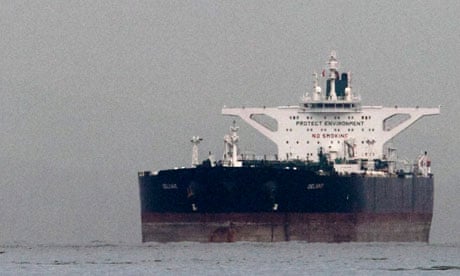The effectiveness of an EU embargo on Iranian oil imports has been cast into doubt by growing evidence of a rise in shipments from the Islamic republic arriving in the Mediterranean.
The apparent surge comes even though tough sanctions are supposed to be stemming the flow.
The latest shipment data show that most oil loaded on to tankers in Iran during the first two weeks of February was bound for Ain Sukhna in Egypt. Analysts from Lloyd's List Intelligence noted that the Gulf of Suez port was a terminal for the SuMed pipeline, feeding oil north to the Mediterranean.
"From the northern Egyptian port, it can be sold on to European countries as it is blended with other Middle Eastern crude oil," Lloyds List said in a recent update. "Saudi Arabia represents 49% of oil pumped through the SuMed pipeline and Iranian crude 46%."
In late January the EU imposed an oil embargo on Iran, with foreign ministers meeting in Brussels ruling that no further oil contracts could be struck between member states and the Islamic republic, though existing delivery deals would be allowed to run until July.
The move takes place amid escalating tensions between the west and Iran over Tehran's nuclear programme. Experts are concerned that Iranian scientists have shifted into a more advanced phase. This, in turn, has raised the prospect of Israel intervening with a pre-emptive strike. An outbreak of hostilities would throw an immediate spotlight on the strategically important strait of Hormuz, in the Gulf, through which almost 40% of the world's seaborne crude exports flow.
While an EU embargo on Iranian crude is already affecting global oil prices, it is the threat of an interruption in supply through the strait that is of greater concern to oil traders and economists.
US and European officials have been pressuring other major economies to curb their use of Iranian oil in support of EU measures. According to Lloyd's List Intelligence, January shipment data suggests there were signs that China – which accounted for about a quarter of Iranian crude exports last year – was electing to go elsewhere for its energy needs. It is said to have taken just 7.9m barrels, or 11% of Iran's oil, for the month.
Lloyd's List Intelligence said China appeared to have turned instead to Angola and Venezuela. But India raised the amount of crude oil imported from Iran in January to 16.2m barrels. This represented a jump of 53% compared with the previous month and is two-thirds higher than average levels recorded last year.
India, South Korea and Japan are among the nations most dependent on imports shipped via the strait of Hormuz. These three, together with China, were the only four nations to take more than 100m tonnes of crude oil via seaborne shipments from the Gulf last year. Italy, Greece and Spain were the most significant European importers of Iranian oil in 2011.







